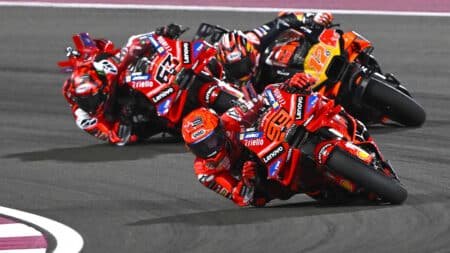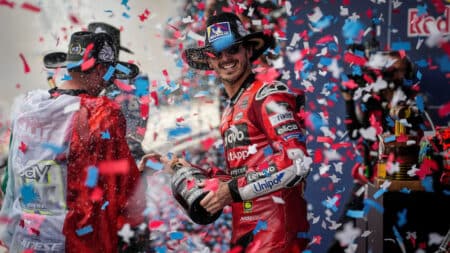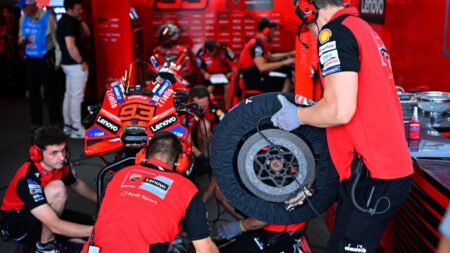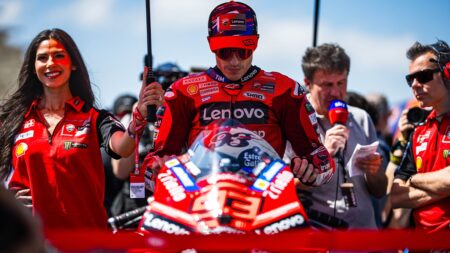
Qatar MotoGP: Márquez on another level, Viñales out of luck
Marc Márquez was on another level at Losail, while Viñales magicked amazing speed out of nowhere in the 2025 MotoGP Qatar GP, Honda made another step and Martin put himself back in hospital
… a wild, crazy anachronism in an even wilder, crazier world
On Saturday afternoon when Jorge Lorenzo, Valentino Rossi, Marc Marquez and the rest are about to qualify for the Catalan GP, there’ll be another gang of racers hurtling their superbikes down leafy country lanes on a small island off the English coast.
Photo: Dave Kneen/Pacemaker Press International
Some fans of the Isle of Man TT have a habit of calling the world’s top MotoGP riders pampered prima donnas. They’re obviously not. They may be much better paid, but when the engines start up and the visors click down, they go out to risk it all.
During last week’s Mugello Grand Prix, Marquez and Lorenzo collided at 210 miles an hour. The impact was big enough to rip off Marquez’s left elbow slider, but the youngster was unfazed and immediately launched into that jaw-dropping last lap.
Top TT riders may be jealous of MotoGP stars’ pay packets, but they’d never call them prima donnas. They’ve all ridden short circuits and fully comprehend that the riding techniques used by men like Lorenzo, Marquez and Rossi are something else.
Twenty-three-time TT winner John McGuinness has shared a racetrack with Rossi. In 2000 he finished 13th in the British 500 GP at Donington; Rossi’s first premier-class victory. Both men share huge mutual respect.
But the TT is very different. A couple of months ago a few of us got to interview McGuinness. Preeminent TT photojournalist Stephen Davidson asked him if he still has any ambitions. “Yeah,” McGuinness replied. “Just to stay in one piece.” The words sent a chill right through me.
Photo: Tim Keeton/Impact Images
Some MotoGP people think the TT is a bad idea. They look upon it as bike racing’s lunatic fringe: risk-taking beyond reason. “It’s not the riders I worry about; it’s their lives, they can do what they want with them,” one MotoGP mechanic told me. “It’s the wives and the kids that I worry about.” You can see his point and it’s not easy to defend the event when tragedy does strike.
The TT is unique and uniquely dangerous – even McGuinness admits to the terror. The final hours leading up to each race are “a horrible bit of your life” and the first charge down Bray Hill is “terrifying, there’s no other way of putting it… you’re hanging on for your life”.
Listen to the John McGuinness podcast
Just watching riders plunge down Bray Hill with new tyres and a full tank of fuel is scary; but, funnily enough, back in the early days of the TT Bray Hill was considered “absolutely the least interesting spot on the whole course”. That’s when the lap record stood at 50mph, not 132mph.
Riders do the TT for the same reason people climb Everest: because it’s there. And because there’s nothing in motorcycling – not even riding a Ducati Desmosedici down Mugello’s start-finish at 220mph – that jangles your nerves and sets your synapses afire like the Mountain course.
It’s the sense of perspective and the feeling of speed that’s really different at the TT. MotoGP riders never experience that fizzing blur of hedges, trees and houses that seems to multiply your actual speed by a factor of 10. It feels insane and, of course, that’s partly the reason it feels so good.
I’ve fallen in and out of love with the TT ever since I first rode motorcycles. When I was a teenager my biggest heroes were Irishman Tom Herron and American Pat Hennen. Herron was one of the last riders who could compete at the front at Grands Prix and at the TT. He lost his life in the North West 200 street race a few weeks before the 1979 TT. The previous year Hennen’s career had been ended by a massive TT crash on the mega-fast run towards the village of Ballaugh, where riders are hunched under the bubble, mentally forcing their right hand not to feather the throttle as they sweep left and right between the grassy banks at 170mph.
Photo: Dave Kneen/Pacemaker Press International
So I never wanted to race at the TT, but then someone asked me to have a go. I spent a few days riding the track on open roads and decided there and then that I wouldn’t do it; it was just too damn crazy. I would do one practice lap and then withdraw; tail firmly between my legs. That was back in the days of early morning practice, when your first lap of the world’s scariest racetrack began at 4.30am. Believe me, there’s no better wake-up call than racing flat-out through sleepy villages, blinded by the rising sun and shivering in the dawn chill on the Mountain. One lap and I was hooked – I’d never had so much fun in my life. I was still peaking on adrenaline as we wolfed down our full English breakfasts in a Douglas café, sharing tales of derring-do.
For a young hooligan who had grown up racing his mates on the open roads, the TT was nirvana. Each and every lap is an epic, an adventure. The course is 37.75 miles long and not a single yard is alike. There’s so much to learn: over 200 corners, some with camber so nasty that it drags you towards the nearest wall or ditch, others where there are manhole covers and patches of shiny asphalt like ice. You learn your way around, cramming your memory banks until they throb, because you know your life depends on it. Everything is at stake; you know that one miscued corner entry may be your last.
The Island envelopes you – the whiff of wild garlic after Rhencullen and the stunning views glimpsed as you climb the Mountain Mile – and so does the history. You race along at top speed where a century ago riders battled along rutted, dusty tracks, sharing the course with everyday traffic on practice days; the last man down the Mountain closing the farmers’ gates behind him.
But most of all it’s the speed. You hardly use the lower few gears: it’s all fourth, fifth and sixth. The road comes at you like you’re watching TV on super-fast-forward; the sunlight glinting through tunnels of trees, the road so dark in places you can hardly see where you’re going.
What it takes race the Isle of Man TT
As Guy Martin told me a couple of years ago. “When you get there, that first evening of practice, you think this is why I do it, this is why I race motorbikes. It’s the speed, you’re licking on and it’s how long you’ve got it wide open in top, then you’re on the side of the tyres, revs rising, waaaah! There is nothing like it… nothing like it.”
The TT is gloriously, wonderfully mad. You either get it or you don’t. If you grew up racing round minimoto tracks you probably won’t get it. If you grew up thrashing road bikes down country lanes you probably will.
I rode six TTs from 1984 to 1989 and then the spell was broken. I had a couple of near misses that shouldn’t have rattled me but they did. I knew my time there was done. That same year five riders died during practice and racing. I wrote a story condemning the whole event, for which I copped a blizzard of abuse. McGuinness still reminds me about it.
Photo: Stephen Davison/Pacemaker Press International
I later changed my mind again. I see little difference between riding the TT and climbing Everest. If someone wants to do either, why stop them? As racer/actor Steve McQueen once said, “The racers I know aren’t courting death. They’re courting being alive.”
Although the TT is a bit mad, the real world is much madder. People who want to ban the racing might better expend their energies elsewhere – towards places where people are made to do things they don’t want to do; like Azerbaijan, a regime that’s soon to cover itself in glory by hosting its first Formula 1 race, never mind the fact that it daily inflicts appalling atrocities on its own people.
After some years in the doldrums, the TT is once again a big deal. For two reasons, I believe. In 2009 Rossi visited and gave the event his blessing. “You are the true warriors,” he told McGuinness. And superb TV coverage has brought the wonder of these unique, anachronistic races to a new audience.
Other MotoGP stars have also visited. Five-time 500cc world champion Mick Doohan – one of the hardest, bravest, fastest racers ever – was one of them. In 2012 he rode a closed-road lap with Ian Hutchinson and a few others. He came away somewhat gobsmacked. I bumped into him a few days later at the British GP and asked him what he thought of the place. “Frickin’ nuts!” he said. When I told him I used to do the TT he gave me one of his looks and said, “I always thought you were a bit odd”.

Marc Márquez was on another level at Losail, while Viñales magicked amazing speed out of nowhere in the 2025 MotoGP Qatar GP, Honda made another step and Martin put himself back in hospital

Bagnaia won his first race of 2025 at COTA but he’s still 5-1 down to his team-mate Marc Márquez, so how will their duel go this weekend in Qatar, which is supposed to better suit Bagnaia’s riding style?

Motorcycle racing is a nasty business, which is why many greatest racers indulge in questionable tactics. Following Marc Márquez’s COTA stunt, here are a few dodgy tales about former MotoGP kings Barry Sheene, Eddie Lawson and Phil Read

Marc Márquez seemed to have hoodwinked them all before Sunday’s COTA Grand Prix got underway, then he threw it all away and Pecco Bagnaia swept to his first win of 2025